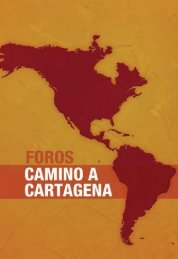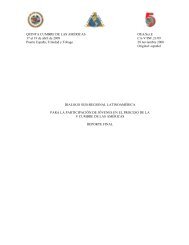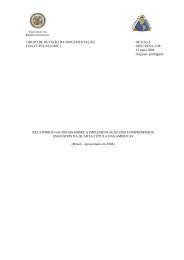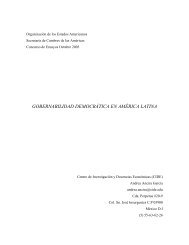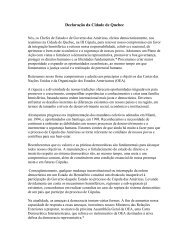The Road to Hemispheric Cooperation: Beyond the Cartagena
The Road to Hemispheric Cooperation: Beyond the Cartagena
The Road to Hemispheric Cooperation: Beyond the Cartagena
Create successful ePaper yourself
Turn your PDF publications into a flip-book with our unique Google optimized e-Paper software.
monopolizes <strong>the</strong> representation of <strong>the</strong> state at inter-governmental<br />
organizations. Thus, no o<strong>the</strong>r branch of government<br />
at <strong>the</strong> OAS is permitted <strong>to</strong> invite <strong>the</strong> secretary general<br />
<strong>to</strong> observe <strong>the</strong> political situation in its country. Nor can<br />
<strong>the</strong> secretary general or a member state invite a branch of<br />
government from ano<strong>the</strong>r member state <strong>to</strong> speak at <strong>the</strong><br />
Permanent Council, without <strong>the</strong> consent of <strong>the</strong> executive<br />
branch. If this were <strong>to</strong> happen, it would be denounced as<br />
intervention in its internal affairs.<br />
<strong>The</strong> problem, however, is that many times it is <strong>the</strong> executive<br />
branch itself that undermines democracy by<br />
abusing power, persecuting political opponents or rigging<br />
elections. <strong>The</strong> OAS mission, sent by <strong>the</strong> secretary<br />
general <strong>to</strong> support President Zelaya’s ill-advised<br />
attempt <strong>to</strong> change <strong>the</strong> constitution so that he might be<br />
reelected, essentially ignored <strong>the</strong> o<strong>the</strong>r branches’ opposition<br />
<strong>to</strong> <strong>the</strong> consulta. Moreover, it had nei<strong>the</strong>r <strong>the</strong><br />
capacity nor <strong>the</strong> time <strong>to</strong> promote dialogue, negotiation<br />
and consensus building amongst <strong>the</strong> protagonists.<br />
Similarly, member states in <strong>the</strong> Permanent Council<br />
could not—or were not willing <strong>to</strong>—invite <strong>the</strong> o<strong>the</strong>r<br />
branches of government <strong>to</strong> hear <strong>the</strong>ir grievances.<br />
<strong>The</strong>ir participation in <strong>the</strong> Permanent Council meetings<br />
<strong>to</strong> analyze <strong>the</strong> Honduras crisis might have prevented<br />
<strong>the</strong> military coup that removed President Zelaya.<br />
Thus, <strong>to</strong> contribute <strong>to</strong> democratic governance and<br />
prevent its erosion, o<strong>the</strong>r branches of government<br />
should be permitted <strong>to</strong> request a visit by <strong>the</strong> secretary<br />
general <strong>to</strong> observe in situ <strong>the</strong> political situation<br />
in <strong>the</strong>ir country, without necessarily having <strong>the</strong> prior<br />
consent of <strong>the</strong> executive. Or <strong>the</strong>y should be allowed<br />
<strong>to</strong> express <strong>the</strong>ir perspectives on a political crisis in <strong>the</strong><br />
Permanent Council, particularly when <strong>the</strong>y feel <strong>the</strong>ir<br />
independence is at risk. <strong>The</strong>ir voices would enrich <strong>the</strong><br />
member states’ understanding and discussion of critical<br />
political situations and would provide <strong>the</strong> basis for<br />
a well-substantiated collective decision <strong>to</strong> protect democracy.<br />
Moreover, <strong>the</strong>ir inclusion would streng<strong>the</strong>n<br />
<strong>the</strong> OAS capacity as a forum for political dialogue and<br />
conflict management <strong>to</strong> prevent <strong>the</strong> collapse of <strong>the</strong><br />
democratic order in a member state. And one might<br />
argue also that a greater involvement of <strong>the</strong> legislative<br />
branch, for example, would even help democratize<br />
and streng<strong>the</strong>n <strong>the</strong> inter-American system. 18<br />
3. Au<strong>to</strong>matic Invitations for Elec<strong>to</strong>ral<br />
Observation Missions<br />
Yet ano<strong>the</strong>r related reform would be <strong>to</strong> establish <strong>the</strong><br />
principle of an au<strong>to</strong>matic invitation for elec<strong>to</strong>ral observation<br />
missions. That is, <strong>the</strong> secretary general, in consultation<br />
with <strong>the</strong> Permanent Council, should have <strong>the</strong><br />
faculty <strong>to</strong> decide where and when <strong>to</strong> send an elec<strong>to</strong>ral<br />
observation mission, without <strong>the</strong> required previous invitation<br />
by <strong>the</strong> government, when he considers it pertinent<br />
<strong>to</strong> do so within <strong>the</strong> framework of <strong>the</strong> Charter.<br />
An alternative or complementary reform could be <strong>to</strong> establish<br />
<strong>the</strong> possibility that a mission be sent at <strong>the</strong> request<br />
of any branch of government, or a significant opposition<br />
political party or media institution. This would<br />
reinforce <strong>the</strong> role of elec<strong>to</strong>ral observation missions and<br />
<strong>the</strong> IADC in promoting and defending democracy. 19<br />
4. Allow Interventions <strong>Beyond</strong> <strong>the</strong> Permanent<br />
Council Assessment<br />
Ano<strong>the</strong>r reform would allow <strong>the</strong> possibility of proactive<br />
engagement or “interventions” by <strong>the</strong> secretary general<br />
or a member state, beyond <strong>the</strong> mere convocation of <strong>the</strong><br />
Permanent Council <strong>to</strong> assess a situation threatening a<br />
democracy (<strong>the</strong>oretically allowed in Article 20). 20 As it is<br />
now, <strong>the</strong> IADC does not allow even a visit by <strong>the</strong> secretary<br />
general <strong>to</strong> analyze <strong>the</strong> situation without a request<br />
or prior consent from <strong>the</strong> executive branch. Nor can <strong>the</strong><br />
secretary general send an elec<strong>to</strong>ral observation mission<br />
without <strong>the</strong> request from <strong>the</strong> executive branch. 21<br />
5. Create an Inter-American Commission <strong>to</strong> Observe<br />
IADC Compliance<br />
A more complex reform would involve creating an inter-<br />
American Commission <strong>to</strong> observe member states’ compliance<br />
with <strong>the</strong> Charter. This Commission would be similar<br />
<strong>to</strong> <strong>the</strong> IAHRC. It would be independent and composed<br />
of five <strong>to</strong> seven experts elected by <strong>the</strong> member states.<br />
Its function would be <strong>to</strong> observe, with appropriate and<br />
rigorous methodology, <strong>the</strong> members’ compliance with<br />
<strong>the</strong> Charter. This could be done by establishing a mutual<br />
evaluation mechanism similar <strong>to</strong> <strong>the</strong> one utilized <strong>to</strong> assess<br />
implementation of <strong>the</strong> Inter-American Convention<br />
against Corruption. 22 <strong>The</strong> Commission would present periodic<br />
reports <strong>to</strong> <strong>the</strong> Permanent Council on <strong>the</strong> state of<br />
democracy in <strong>the</strong> hemisphere, and could advise or pro-<br />
<strong>The</strong> <strong>Road</strong> <strong>to</strong> <strong>Hemispheric</strong> <strong>Cooperation</strong>: <strong>Beyond</strong> <strong>the</strong> <strong>Cartagena</strong> Summit of <strong>the</strong> Americas<br />
<strong>The</strong> Brookings Institution ❘ Latin America Initiative<br />
84



